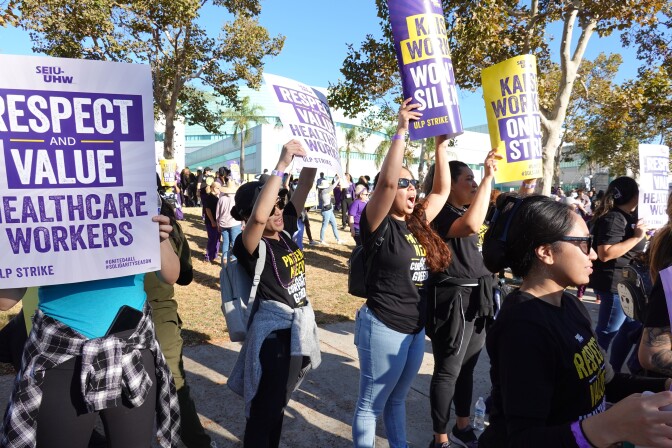About 85,000 unionized health care workers in several states, including more than 28,000 in California, have reached a tentative agreement for a new four-year contract with Kaiser Permanente.
The deal was reached early Friday after more than six months of negotiations and a three-day strike that ended last week.
The details of the agreement haven’t been released yet, but according to a joint statement from Kaiser Permanente and the Coalition of Kaiser Permanente Unions, the tentative deal includes:
- Establishing a new minimum wage over the next three years. The minimum wage for California workers will reach $25 an hour. The minimum wage will reach $23 an hour for workers in the other states Kaiser serves, including Washington, Oregon, and Colorado.
- A guaranteed 21% wage increase across-the-board over the next four years.
- Added investments in job training and professional development to help retain employees and address the staffing crisis in healthcare.
- Revamped Performance Sharing Plan for employees with payout opportunities.
Dave Regan is the president of SEIU United Healthcare Workers West, the largest union in the coalition. He described the new minimum wage as “industry-leading” and allows the workforce to “not just keep up with, but exceed, the cost of living that people are struggling with across the country.”
Regan said the proposed deal includes important agreements that will help workers grow their skills and advance their careers into higher paying positions. He said it also includes an unprecedented commitment to bringing in thousands of new health care workers that aren’t currently in the industry.
Greg Holmes, the senior vice president and chief human resources officer for Kaiser Permanente, said they are very proud that the agreement includes competitive wages. He said Kaiser executives believe the new contract will help them continue to have some of the best employees in healthcare.
“With those employees, we’ll be able to deliver on our mission of providing high quality, affordable, and accessible healthcare to our members,” Holmes said. “I think we're all aligned around those goals.”
Kaiser Permanente reps said they do not expect the tentative agreement to increase patient costs.
Both sides thanked acting Labor Secretary Julie Su for her “instrumental involvement” in negotiations. Su flew back to her home state of California for two all-night bargaining sessions that began Wednesday to help both sides find common ground.
We are excited to have reached a tentative agreement with the frontline health care workers of the @UnionCoalition this morning. We are thankful for the instrumental involvement of Acting U.S. Labor Secretary @ActSecJulieSu .
— Kaiser Permanente (@aboutKP) October 13, 2023
A full announcement will follow shortly. pic.twitter.com/MGzFnrHdFA
The unionized health care workers are expected to begin voting to ratify the tentative agreement next Wednesday. If ratified, the four year contract will retroactively go into effect on Oct. 1.
Before reaching the tentative agreement, the coalition of unions threatened a second, longer strike in November, but have now withdrawn the strike notice.
About 34% of Kaiser’s Southern California workforce, including medical assistants, surgical technicians, respiratory therapists, ultrasound sonographers, and phlebotomists, walked off the job last Wednesday for a three-day strike. The unionized healthcare workers had been seeking better pay and improved staffing levels after their contract expired on Sept. 30.
Kaiser Permanente had planned to keep all of its hospitals and facilities open during the strike, but some labs were forced to close and some scheduled appointments were switched to virtual.
Kaiser Permanente is California’s largest insurer and healthcare provider. The last time Kaiser and the coalition of unions negotiated a new contract was in 2019, before the COVID-19 pandemic.









